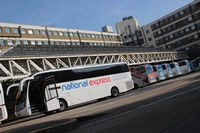
TfL announces the trial of mixed use bays and a pilot marshalling scheme for tourist coaches in London
Transport for London (TfL) has announced that it has begun two trials designed to support coach drivers operating in the capital. The trials, of mixed use bays and a pilot marshalling scheme, are two key actions from the Tourist Coach Action Plan (TCAP), being delivered jointly by TfL and the Confederation of Passenger Transport (CPT), London boroughs and other partners.
Launched in autumn 2013, TCAP sets out 26 actions to be delivered over the next five years. The actions aim to ensure better access for tourist coaches; smarter use of stopping and parking spaces; an improved perception of coaches and a more robust approach to discussing the challenges and opportunities for tourist coaches in the capital.
The trial of mixed use bays will assess the benefits of reclassifying selected loading bays on the TfL Road Network, so they retain their primary function as a loading bay, but are also available for coaches to pick up and set down passengers. An initial short list of locations was considered and the following three trial locations were selected: Vauxhall Bridge Road (south of Neathouse Place); Commercial Street (southbound carriageway south of Brushfield Street); and Park Lane (Southbound at Marble Arch).
The Whitechapel Art Gallery mixed use bay traffic order is in place but temporarily closed due to Cycle Superhighway works, once they are complete the traffic order will be reinstated.
Given the competing demands for road space in London, it is hoped that the trial will show how mixed use bays can make better use of existing facilities, balancing the needs of the coach and freight industries. These sites will be monitored (including stakeholder engagement) during the 18-month trial and the TCAP Programme Board will review the results. If the trial is a success, TfL will work with operators and key London boroughs to identify and deliver mixed use bays in other locations of high demand.
The pilot marshalling scheme aims to maximise the efficient use of road space and help reduce congestion caused by coaches which overstay on coach parking facilities at specific tourist attractions on the road network. Working in conjunction with Westminster City Council, TfL has developed a pilot study at key locations in central London including Aldwych, Buckingham Gate and Cromwell Road.
The marshals have been trained at TfL’s Victoria Coach Station to provide coach drivers with assistance and monitor the coach bays. Where coach drivers overstay they are asked to move on and provided with alternative suitable parking locations on request.
As with the work on mixed use bay parking, the data from this marshalling trial will be analysed and presented to the TCAP Programme Board. The Board will review the benefits with a view to extending the trial to sites in areas of high demand.
Ben Plowden, TfL’s Director of Strategy for Surface Transport, said: “We are well aware of the importance of the coach industry to London’s economy and we recognise the additional pressures faced by coach operators due to ongoing major developments and road works that are impacting on parking and congestion.
“These new trials represent an important step forward in our work with the CPT to implement the actions prioritised within the TCAP to make better use of road space in London and to help coach drivers who operate here.”
Stephen Smith, CPT’s UK Operations Director, said: “CPT welcomes and supports this trial of mixed use bays and coach marshalling. At this difficult time for coaches operating in London, with fewer coach parking spaces available and increasing traffic congestion, these additional spaces will offer some welcome relief for hard pressed coach operators seeking to make a positive contribution to London’s thriving tourist economy.”


